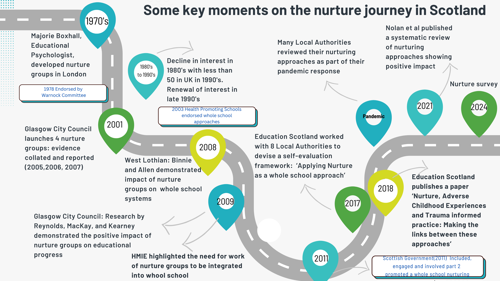Nurture in Scotland: Background
In the 1970s the educational psychologist Marjorie Boxall developed nurture groups in London. In 1978 these groups were endorsed by the Warnock Committee.
From 1980 to 1990 there was a decline in interest. There were less than 50 nurture groups in the UK in 1990. There was a renewal of interest in the late 1990s.
Timeline infographic

The above infographic highlights some of the key moments in Scotland’s nurture journey. In the 1970’s Marjorie Boxhall, Educational Psychologist, developed nurture groups in London. In 1978 nurture groups were endorsed by the Warnock Committee. In the 1980’s there was a decline in interest with less than 50 in the UK in the 1990’s.
There was a renewal of interest in the late 1990’s. In 2001 Glasgow City Council launched four nurture groups: the evidence was collated and reported. In 2003 Health Promoting Schools endorsed whole school approaches. In 2008 Binnie and Allen demonstrated the impact of nurture groups on whole school systems.
In 2009 research by Glasgow City Council, Reynolds, MacKay and Kearney demonstrated the positive impact of nurture groups on educational progress. HMIE highlighted the need for the work of nurture groups to be integrated into the whole school. In 2011 the Scottish Government report ‘Included, Engaged and Involved Part two promoted a whole school approach.
In 2017 Education Scotland worked with eight Local Authorities to devise a self-evaluation framework: ‘Applying Nurture as a whole school approach’. In 2018 Education Scotland published a paper ‘Nurture, Adverse Childhood Experiences and Trauma informed practice: making the links between these approaches’.
The Pandemic-many local authorities reviewed their nurturing approaches as part of their pandemic response. In 2021 Nolan et al published a systematic review of nurturing approaches showing positive impact. In 2024 this nurture survey took place.
Psychological Services have had a key role in gathering evidence to measure impact. The move from nurture groups to whole school nurturing approaches was a response to growing evidence that a nurturing approach can benefit all learners. It has also been important to make the links for educators and strategic leads by showing how nurture, ACES and trauma-informed work are inter-related.
